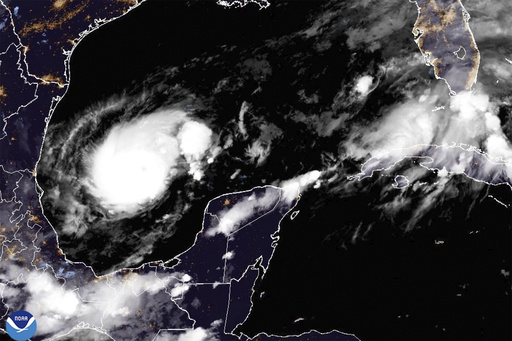Florida is preparing for potentially its largest evacuation in seven years as Hurricane Milton gains strength over warm waters and heads towards major population centers, including Tampa and Orlando. The last sizable evacuation in the state took place in 2017 when around 7 million people were urged to flee due to Hurricane Irma. This evacuation caused traffic jams, long lines at gas stations, and frustration among evacuees.
As of late Sunday night, Hurricane Milton was approximately 230 miles west-northwest of Progreso, Mexico, and 765 miles west-southwest of Tampa, packing maximum sustained winds of 90 mph, according to the National Hurricane Center. The forecast models predict that Milton could make landfall in the Tampa Bay area on Wednesday and maintain hurricane strength as it moves across central Florida into the Atlantic Ocean.
Residents in Mexico’s Yucatan Peninsula, the Florida Peninsula, the Florida Keys, and the northwestern Bahamas have been advised to monitor the hurricane’s progress. The storm is expected to bring heavy rainfall, potentially causing flooding in Florida with up to a foot of rainfall in some areas by Wednesday night.
To prepare for the impending impact, Florida is strategically placing emergency fuel for gas vehicles and charging stations for electric vehicles along evacuation routes. Governor Ron DeSantis stressed the importance of being prepared, especially for those living on the west coast of Florida and barrier islands.
Furthermore, Florida has expanded the state of emergency declaration to 51 counties, urging residents to stock up on food and water and be ready for potential power outages and disruptions. All classes and school activities in Pinellas County have been canceled preemptively, and Tampa residents have been offered free parking in city garages to protect their cars from floodwaters.
Despite ongoing recovery efforts from Hurricane Helene, which caused widespread damage and fatalities, FEMA is already gearing up for Hurricane Milton. The agency has provided over $137 million in federal disaster assistance and mobilized thousands of personnel to assist with relief efforts in the impacted areas.
FEMA Administrator Deanne Criswell emphasized the agency’s commitment to supporting communities affected by hurricanes and denounced misinformation and political rhetoric that could hinder relief efforts. The agency is collaborating closely with the state of Florida to prepare for the potential impacts of Hurricane Milton, demonstrating a proactive approach to disaster response.
President Biden assured continued support for affected families and emphasized bipartisan cooperation in the recovery and rebuilding process. As Hurricane Milton approaches, federal and state authorities are working together to ensure swift and effective response efforts to mitigate the storm’s impact and assist those in need.


